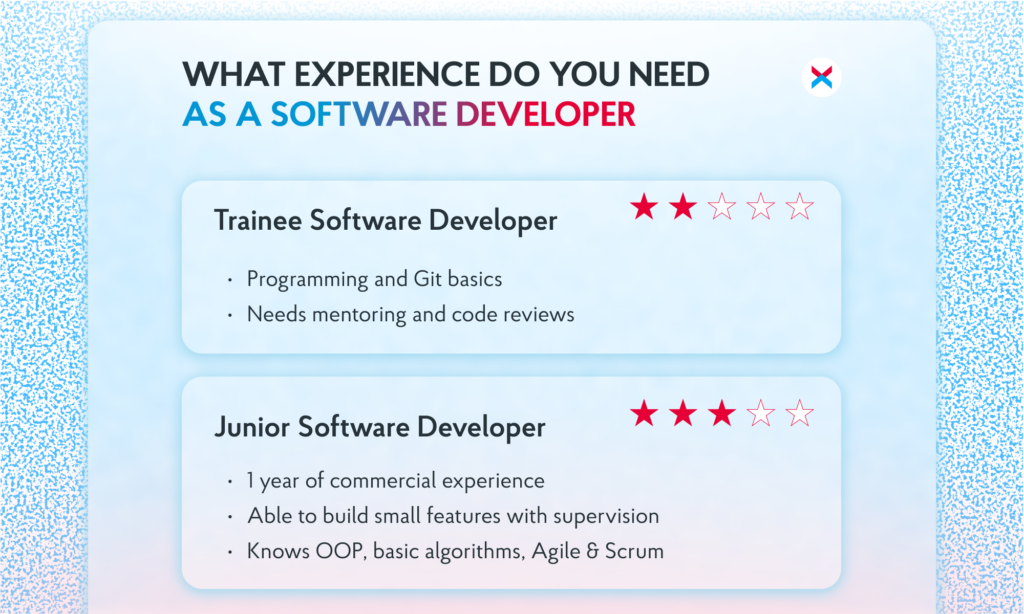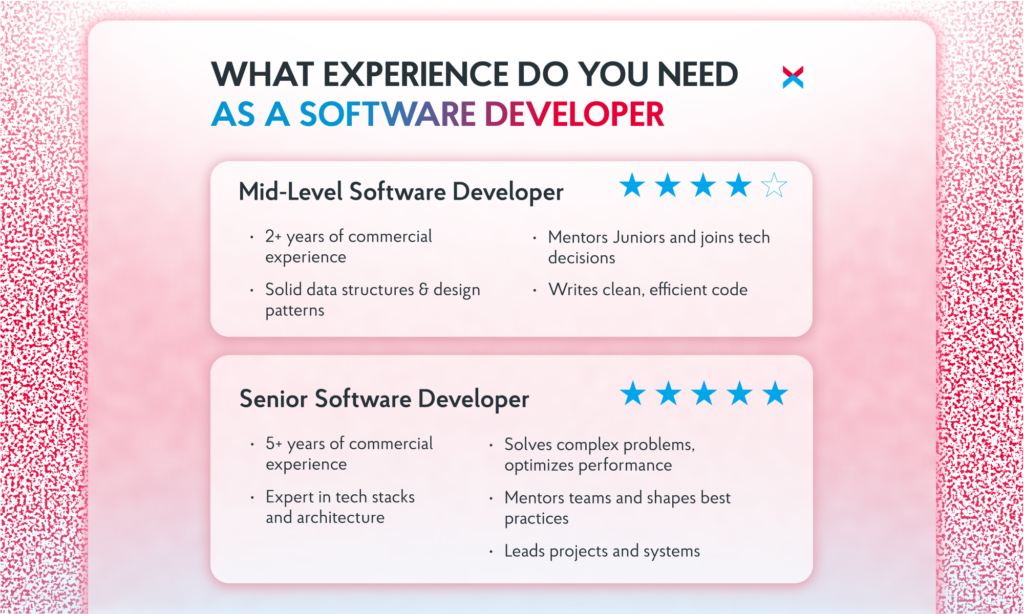Are you interested in becoming a software developer, but have no idea what to expect from this role? You’re in the right place!
In this article, we’re going to answer your most important questions, such as what does a software developer do, what the top software developer skills are, and how you can get the necessary education and experience to apply for a job at an international IT company like NIX.
Are you ready? Let’s dive in!
Who Is a Software Developer?
Software developers create, build, and maintain the programs and applications that run on computers, smartphones, and other devices. They write the instructions (code) that tell a program what to do. Many developers also test their software to make sure it works properly, fix issues (bugs), and update it when new features are needed.
Generally speaking, a software developer turns ideas into real, working software that people and businesses use every day.
Types of Software Developers
There are several kinds of software developers based on what they specialize in. The most basic distinction is based on the part of the software they work on.
| Core Area | What They Do |
| Frontend Developer | Builds what users see (websites, apps, UI). |
| Backend Developer | Builds the server, database, and logic behind apps. |
| Full-Stack Developer | Can do both frontend and backend. |
We can also categorize software development based on the type of project or platform. For example, mobile developers focus on mobile apps, game developers on games, and embedded systems software developers on smart programmed devices such as fridges and cars.
However, when it comes to software developer job descriptions, one of the main focuses falls on what programming languages they use.
Software Developer or Software Engineer?
In everyday language, these two expressions are used as synonyms. For example, when looking for a job, the position’s name can be either, and the job duties remain the same (unless you apply for a role at Google!).
However, if we want to go into the details, a Software Developer focuses mainly on writing code to build software applications. They are more involved in the creative side of software development: developing features, solving programming problems, and delivering software that works.
On the other hand, a Software Engineer approaches software building from a more systematic and engineering perspective. They often think about the architecture, scalability, design patterns, and long-term sustainability of the codebase. It’s a broader, more formalized role, thinking like an engineer (planning, building, maintaining structures).
So, now you know the difference!
What Do Software Developers Do: Job Description of a Software Developer
When you check our IT jobs, you’ll first notice that the names of the software developer positions contain both the specialization and the programming language, plus the level of experience (Junior, Medior, or Senior).
For example:
- Senior Full Stack JS Developer
- Junior Full Stack .NET Developer
- Medior PHP + React Developer
The requirements change based on these three things. However, there are some skills needed for software developer that are universal. Below, we list the top skills a successful software developer would need, including personal and technical skills. And here are some extra some tips on what counts as good skill to put on resume!
Key Soft Skills for Software Developers
Teamwork
You will join a team of specialists, including tech experts, graphic designers, and business analysts. You will have to collaborate with them and understand their point of view every single day of the software development process.
Communication skills
To work in a team and to discuss details with the client, you need excellent verbal and written communication skills. However, if you’re shy or a bit introverted, don’t worry, this skill can be developed over time, and you’ll receive plenty of support from the project managers and your lead.
Flexibility
Tight deadlines or difficult clients can create a lot of pressure on you. It is important to know how to navigate such hardships and find a compromise with an open mindset. Problem solving skills can also fall into this category.
Time management skills
At every software developer job, it is crucial to meet deadlines. Of course, project managers can support you, but at the end of the day, only you know how much time it takes for you to complete a task, and calculate with it.
Desire to develop
Developing not only software but yourself is a key requirement. New technologies emerge every day, and as a software developer, you need to be on the front lines of these changes, being up to date with the latest tools and methodologies.
Key Hard Skills for Software Developers
Programming languages
Whether you are a .NET, Java, or Python software developer, you need to have excellent knowledge of that coding language.
Version control systems
Companies in the IT industry use version control systems, such as Git, GitHub, or GitLab. You’ll have an advantage if you already know how to use them.
Data structures and algorithms
Understanding this is essential for writing efficient code and developing software.
Database management
Even if you’re not a data engineer, databases such as SQL, NoSQL, and MongoDB are important software developer skills.
API Design and Integration
Knowing how to design and integrate APIs, especially REST APIs and GraphQL, is a key part of building connected applications.
Testing and debugging skills
Most projects include QA specialists to lead testing. However, it will help you a lot to know how to perform unit tests, integration tests, and use frameworks like Jest and JUnit. Most of what you’ll do is identify issues and solve problems to meet user needs.
Cloud computing
Understanding the basics of cloud computing platforms such as AWS, Azure, and Google Cloud Platform is becoming increasingly essential.
Containerization and orchestration tools
Familiarity with containerization and orchestration tools like Docker and Kubernetes is important for deploying and managing applications efficiently.
Software development methodologies
Knowing how software projects are managed, such as through Agile, Scrum, and Kanban methodologies, is crucial.
Security Best Practices
Make sure to know basic secure coding, authentication, authorization, and encryption techniques and tools, so you can protect the software you’re working on.
A Day in the Life of a Software Developer

If you are still not sure what does a software developer do, let’s discuss what the main software developer responsibilities are that you’ll face on an average day.
Every day as a software developer brings new tasks and challenges, but there’s a typical rhythm most developers follow, especially when working on an active project.
The day often starts with a daily meeting, where the software development team quickly discusses what they accomplished yesterday, what they’re working on today, and if they have any blockers that need help. These meetings are usually part of Agile or Scrum software development processes.
After the meeting, software developers dive into their main responsibilities:
- Writing code to develop new features, fix bugs, or improve existing functionality.
- Testing their own code, running unit tests, and sometimes reviewing others’ code (known as code reviews).
- Debugging: If something doesn’t work as expected, a big part of the day might be spent investigating the issue and finding solutions.
- Collaborating with teammates like designers, QA testers, and other developers to align on the project goals.
- Attending planning sessions or technical discussions: Some days include meetings where the team discusses upcoming tasks, makes architectural decisions, or refines user stories and software requirements.
- Documenting: Software developers also document their code and update project documentation to make sure their work is understandable to others.
Throughout the day, they usually work closely with:
- Other developers (front-end, back-end, or full-stack teammates)
- QA engineers who test the software
- Project managers or product owners who prioritize tasks
- Business analysts who make sure the client’s requirements are met
- UI/UX designers who provide the visual and interaction designs
- DevOps specialists (for deployment and infrastructure questions)
At the end of the day, software developers often review what they achieved and prepare for the next day’s tasks. Some teams also have informal sync-ups to discuss any issues that come up.
While much of the time is spent quietly focused on coding, teamwork is key to success. Software developers work in teams, remember that.
What Education Do Software Developers Need?
Many software developers start their journey by earning a university degree in Computer Science, Software Engineering, or a related technical field. Formal education in these programs provides a strong foundation in programming, algorithms, and software design, and is still a common pathway into the industry.
However, in today’s fast-paced tech world, computer science degree programs aren’t the only way to build a successful software development career. Many companies now focus more on skills and practical experience rather than diplomas.
This means that motivated learners who complete specialized coding courses or software development bootcamps can also land software developer roles – sometimes even faster and more efficiently.
At NIX, we also offer free software development courses because we believe that talent should be nurtured, whether our students are undergraduates, career switchers, or experienced IT specialists.
What’s more, most of our students have the chance to join our team as a full-time software developer after finishing their studies!
If you’d like to master .NET, JavaScript, Java, or any other programming skills, check out our courses and apply!
How Much Experience Do Software Developers Need?
IT specialists, including software developers, are divided into levels based on their knowledge. Each level has different requirements for experience and skills needed to develop software.

Trainee Software Engineer/Software Developer:
- Basic understanding of at least one programming language (e.g., Java, Python, C#).
- Familiarity with version control tools like Git.
- Awareness of basic concepts like variables, loops, functions, and simple data structures (arrays, lists).
- Basic understanding of what software development is, but still learning coding best practices.
- Needs close guidance, mentoring, and code reviews to grow.
Junior Software Engineer/Software Developer:
- Has 1 year of commercial experience in software development.
- Can write small programs or features with limited supervision.
- Basic knowledge of algorithms, data structures, and object-oriented programming (OOP).
- Understands how to debug simple issues.
- Familiar with simple databases (SQL basics) and can perform basic CRUD operations (Create, Read, Update, Delete).
- Can use basic frameworks or libraries relevant to their tech stack.
- Familiar with Agile or Scrum work environments.
- Still learning about code optimization, testing, and architecture.

Mid-level Software Engineer/Software Developer:
- Has 2 years of commercial experience in software development.
- Can independently handle features or modules from start to finish.
- Solid understanding of data structures, algorithms, and design patterns.
- Writes clean, maintainable, and efficient code with minimal supervision.
- Understands and applies best practices like unit testing, code reviews, and documentation.
- Has experience working with APIs, external libraries, and third-party services.
Good understanding of databases, query optimization, and backend/frontend integration (depending on their role). - Begins mentoring juniors and participating more in technical decisions.
Senior Software Engineer/Software Developer:
- Has 5 years of commercial experience in software development.
- Takes ownership of complex features, projects, or entire software systems.
- Deep expertise in one or more programming languages and tech stacks.
- Understands software system design, architecture patterns, and scalability principles.
- Optimizes code performance and suggests architectural improvements.
- Proficient in troubleshooting complex problems and debugging production issues.
- Mentors juniors and mid-level developers; often leads technical discussions and code reviews.
- Collaborates with stakeholders (Product Owners, Designers, QA) and balances technical solutions with business needs.
- Often involved in setting coding standards, best practices, and driving continuous improvement within the team.
Now you can see what does a software developer do in details, and the difference between Juniors and Seniors. Where do you fit on this scale of skills?
Certifications for Software Developers
In every country, there are several local software development certifications that you can acquire. However, some international professional certificates can help you in building your software development career.
Watch out, these are additional certifications – we have already discussed the fundamental courses and skills for software developers above!
- AWS Certification. It focuses on developing and maintaining applications on Amazon Web Services. It’s very respected if you work with cloud-based applications, and since NIX is an AWS Partner, at our organization, this will definitely be appreciated.
- Microsoft Certification: Azure Fundamentals. Ideal for software developers who build and maintain cloud applications on Microsoft Azure.
- Salesforce Certification. Perfect to showcase your deep understanding of this popular, cloud-based customer relationship management software.
- Oracle Certification. You can get proof of your Java, SQL, cloud infrastructure, or database development skills.
- AI & Machine Learning Certification. This is one of the hottest technology advances, and especially necessary for mobile application software developers. IBM, Microsoft, Google, and AWS are all offering certifications in this field.
Software Developer Salary and Career Outlook
It is no secret that the best software developers earn well. But how much can you get depending on your specialization?
Check out our table below to see the average salary based on the calculations of HR portals!
The average software developer salary range in Hungary in 2024
| Position | Monthly Salary (Junior min. – Senior max.) |
| Java Developer | 800 000 Ft – 2 000 000 HUF |
| JavaScript Developer | 800 000 Ft – 2 000 000 HUF |
| .NET Developer | 750 000 Ft – 2 000 000 HUF |
| PHP Developer | 650 000 Ft – 1 800 000 HUF |
| C++ Developer | 800 000 Ft – 1 800 000 HUF |
| Python Developer | 800 000 Ft – 2 200 000 HUF |
| FullStack Developer | 900 000 Ft – 2 000 000 HUF |
| Mobile Developer | 800 000 Ft – 2 100 000 HUF |
How to Get a Job as a Software Developer
Once you have the necessary software development skills, knowledge, and certifications, getting a position as a software developer is not that difficult. There are hundreds of job opportunities if you want to develop software, and the need for new software is still increasing.
What you still might lack is experience, but a lot of companies offer solutions for that. At NIX, you can join one of our courses or free IT events to gain hands-on experience and connect with industry professionals.
These events (workshops, marathons, boot camps, etc.) are a great way to get your foot in the door, to show recruiters what you know in a real environment. We have plenty of success stories, when applicants, who were initially rejected, joined one of our software development courses or events and then got hired into a software developer role.
So, it is time for you to send your CV and show us what you can do!






